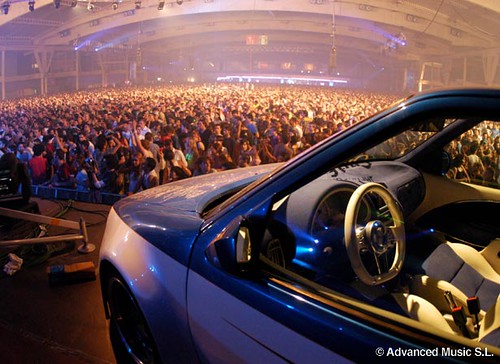Es verano y ya ha amanecido en Londres. La brisa tibia de la ciudad recorre las calles y el sonido del underground raspa el asfalto desde abajo. Los rostros de los hombres están blancos, fantasmales, como una pastilla recién manufacturada. Los oídos todavía escuchan la música en forma de extensa línea roja que parece no desvanecer. La piel de las mujeres es blanca y las negras que trajeron de África hace siglos se ven pálidas y atractivas. Pupilas dilatadas. Fosas nasales llenas de polvo blanco ensangrentado de Colombia. Dentro. Antes. Todo son beats. Del VIP lounge en el tercer piso hasta el sótano de sudor humeante en el que todos son sospechosos pero nadie acusa a nadie. Veo a los chicos malos acercarse a las mujeres guapas como sex pistols que no se han limpiado el culo hace semanas, con ojos de sangre que dan miedo pero que a alguna habrán de atraer. El chico japonés del diminuto teléfono manga graba un video on-line del cuerpo ácido y fluyente de Jeff Mills, que se equivoca en los tornamesas cada dos cortes porque la piel de sus ojos brilla para adentro y no ve nada. Pero a Mills hay que pagarle en bits, porque le puso música de 2004 al 2001 de Kubrick, y me mostró la materia de la palabra Beyond, del imperativo Never Stop, del concepto de Frontera. A esta calle de la Londra he llegado solo pero me han inscrito en la lista. Eso me pone dentro de The End. Ahora sólo debo encontrar a Ralf, mi amigo alemán de Barcelona.
A Ralf lo he conocido en Barza hace un par de semanas en la Zona Temporalmente Autónoma del Sonar. El festival de música electrónica y arte multimedia que vibra anualmente en el mediterraneo desde mil nueve 94 y que sigue atrayendo a niños bien de todo el planeta. En la mitad del galpón de feria exposición europea en el que se lleva a cabo la fiesta final del festival – un espacio en el que siento por primera vez la realidad y el significado de la posmodernidad y la muerte de dios, un espacio donde todo es un simulacro simplemente fugaz – Cesar Londoño, un colombiano, fundador del sitio de Internet pressriot.com, me dice “en 2003 conocí a unos locos de Nueva Zelandia que vinieron hasta Barcelona sólo para el fin de semana del Sonar. Un viaje de 24 horas. Llegaron, estuvieron dos días, se pusieron verdes y se devolvieron”. Tan solo un case study de un comportamiento general. 24 hours party-journey people.
La empresa que produce y vende este evento cultural diseñado para las sociedades industriales avanzadas se llama Advanced Music. Me parece un nombre consistente cuando lo escucho... con una pastilla avanzada en mi cabeza. El galpón, el corral de entretenimiento para las mentes entumecidas y confortables de once mil jóvenes-adultos de los OECD countries es un recinto claroscuro y denso, como la sala ritual de alguno de los capítulos de la mitad del Mundo Feliz de Huxley. Las luces robóticas se revientan contra las paredes del lugar y contra los ojos abismados de los invitados que pagaron en euros y no en dólares. El sonido explota de lado a lado, fluyendo entre las diferentes capas de parlantes que avanzan colgadas al techo, con formación militar, desde el escenario hasta la pista de carros chocones de neón en la que niñas X de Europa oriental y niños Y de occidente se divierten extasiados, se miran de reojo, con ganas de follar, con risas de pecados pasados, totalmente concientes de que jamás se van a acariciar. La sociedad simétrica así se expresa. 18 pantallas de video han sido repartidas a lo largo de la bodega, para que todos veamos lo que no existe, para que escuchemos lo que no está sonando, para que sintamos las emisiones de una materia de la que ya no nos interesa entender nada pero a la cual reverenciamos porque hace que la droga se sienta mejor. Cuando todo está por comenzar, la piel de los brazos se me pone de gallina, mi pene deja que una gota de orina se resbale, me siento como el niño que fui el primer día de colegio cuando conecté por casualidad, y con certeza, con los ojos de mi primer amigo. Cuando la pantalla de cristal líquido que enmarca el escenario brilla al fin con un amarillo alarmante y enceguecedor, las notas de “teardrop” tocan la puerta de la memoria a través de mis oídos. La fiesta comienza – debo recalcarlo - comienza con un concierto de Massive Attack. Al principio de este performance OECD siento miedo de la felicidad y miedo por la música optimista y tripeta de esta banda contrapunto del UK. Cuando terminan, después de su ataque masivo, y comienza Miss Kittin, Claudia, otra amiga colombiana adorada que me habla con un código que perfectamente entiendo me dice: “Ahora sí, con Miss Kittin.... Cójase el culo!!!”. Miss Kittin es una Dj-porno Francesa que canta mientras pincha. En uno de sus cortes de techno-electro rappea lo siguiente con voz tipo “fuck me!”: “To be famous is so nice... Suck my dick! Lick my ass!”. Mis ojos y mis oídos están maravillados. Mis manos acarician las minúsculas gotas de sudor que cubren la piel suave de mi rostro. El mundo está llevado... y yo me cojo el culo.
Carlos Peralta-Caceres
Ámsterdam
Noviembre 2004 / January 2005





